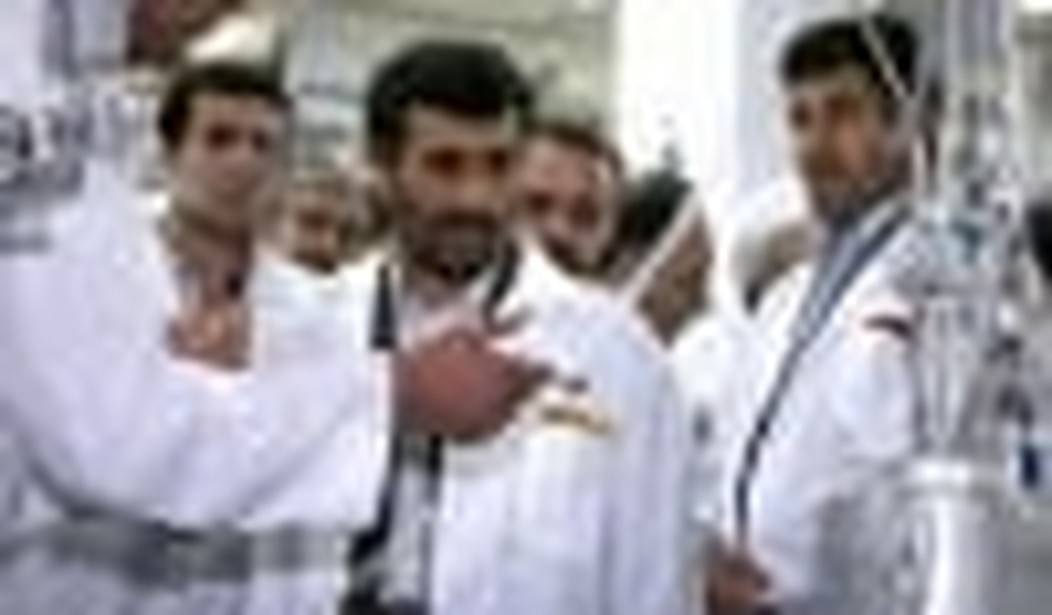On April 8th, Iran’s National Day of Nuclear Technology, President Mahmoud Ahmadinejad declared that Iranian scientists were “putting 6,000 new centrifuges into place”. This statement indicates that Iran will be adding another 3,000 centrifuges to the 3,000 already installed and declared to the International Atomic Energy Agency (IAEA).
Ahamidnejad went on to say that Iranian scientists were testing a new type of centrifuge that works five times faster the P1 centrifuges which Iran is already operating.
The Iranian president could be boasting. Some analysts, such as those close to the IAEA, said today that Iran is having enough difficulties operating its current 3,000 centrifuges. Therefore its unlikely that Iran could install and run more.
This may be a valid assumption. With the economy in the doldrums, and presidential elections approaching, Ahmadinejad needs all the prestige he can muster to boost his falling popularity.
Furthermore, the Iranian government has recently asked the Americans to start new negotiations over Iraq. By making its nuclear program look more advanced than it is, Ahmadinejad, and his boss Ayatollah Khamenei, may be hoping that this could translate into a stronger bargaining position for Tehran at the negotiating table.
However, one must not also rule out the possibility that Ahmadinejad is telling the truth. Telling a lie of this proportion could be a severe embarrassment for the president, as such claims will have to be substantiated during IAEA’s future inspections to Iran’s nuclear facilities.
If they can not be substantiated, not only would such claims make the Iranian president look like a liar, it could also lead to further suspicion that despite the NIE report, Iran is running a secret nuclear program.
With sanctions failing to deter the Iranian government, as far as Iran’s supreme leader is concerned, nothing — apart from technical difficulties — could halt Iran’s march to nuclear glory. Luckily for Ahmadinejad, when it comes to the nuclear program, he has the full backing of the supreme leader, who has the final word over such matters.
This should make the leaders of the Western world very worried. With the situation in Gaza and Lebanon worsening every day, such confidence shown by Iran could translate into major outbreak of violence in those troubled areas.
This could push Sunni countries into the direction of developing their own nuclear programs. Furthermore, concerned by Iran’s expanding influence in Iraq and their growing belligerence in the Middle East, Sunni countries could continue or even increase their financial support to Sunni fighters in Iraq, as Saudi Arabia has been doing. In such a case the US could forget about total withdrawal from Iraq within the next year, or even two, no matter what Democrats promise to American voters.
Although the US seems hopeless in its efforts to bring international consensus against Iran in the UN, there is nevertheless one area which Washington could hurt Iran’s regional drive: Iraq.
The American government must listen to General Petraeus’s recommendation that US troop withdrawals from Iraq should be suspended. The current US advances in bringing more security to Iraq is one of the reasons why Iran recently decided to request more talks with Washington. To lose this advantage could mean losing one of the only means of leverage America has against Iran.
If anything, more troops are needed for Iraq. However, this seems unlikely as the mounting casualties have left the US population with little appetite to send more of their sons to war.
Instead of this, more money should be pumped into Iraq’s reconstruction projects as a means of increasing America’s position in Iraq and decreasing Iran’s clout. And the money does not have to only come from the US. America could pressure the Saudis into redirecting some of their current assistance to insurgents, into reconstruction projects in Iraq.
In absence of more troops, increased economic welfare for Iraqis could reduce Iran’s influence in Iraq thus forcing Ayatollah Khamenei and his soldier Mahmoud Ahmadinejad to rethink their current belligerent strategy.
For now, Iran is clearly the winner. Its nuclear program and influence in the region is moving forward. It seems unlikely that the international community could do much to halt its nuclear drive. However, Tehran’s regional influence is more susceptible to pressures and challenges. Unless this weak spot is exploited, the West could soon be looking at a regional nuclear super power whose president is not shy to publicly doubt September 11th and its 3000 victims.
Meir Javedanfar is the co-author of The Nuclear Sphinx of Tehran – Mahmoud Ahmadinejad and the State of Iran. He runs Middle East Economic and Political Analysis (MEEPAS).








Join the conversation as a VIP Member